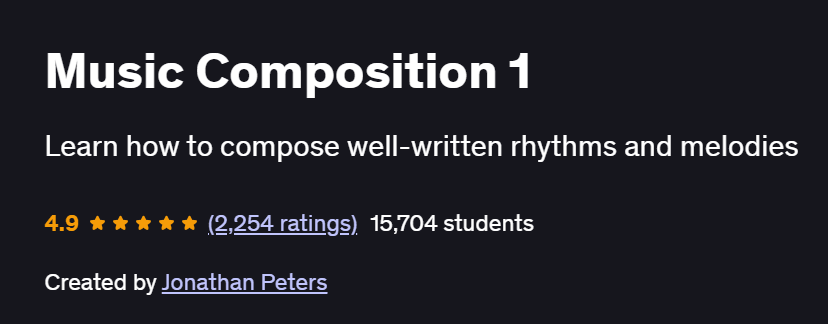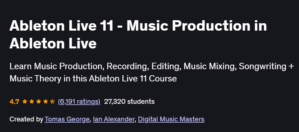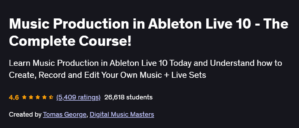What will you in Music Composition 1 Course
Develop strong melodic ideas and thematic motifs
Understand harmony: triads, seventh chords, and functional progressions
Master form and structure: binary, ternary, sonata, and song forms
Orchestrate for small ensembles using instrumentation principles
Apply counterpoint techniques and effective voice leading
Program Overview
Introduction to Composition Principles
⏳ 30 minutes
The creative process: inspiration, sketching, and development
Overview of notation tools and software
Melody & Motif Development
⏳ 1 hour
Crafting memorable themes using intervallic and rhythmic variation
Techniques for motivic transformation and sequence
Harmony & Progression Basics
⏳ 1 hour
Building triads and seventh chords in major/minor contexts
Functional progressions (I–IV–V–I, ii–V–I) and secondary dominants
Form & Structure
⏳ 45 minutes
Binary and ternary forms, phrase and period construction
Overview of sonata, rondo, and strophic/song forms
Counterpoint & Voice Leading
⏳ 1 hour
Two-voice counterpoint rules (species counterpoint)
Smooth voice leading and avoiding parallel fifths/octaves
Orchestration for Small Ensembles
⏳ 1 hour
Instrument ranges, timbre blending, and score layout
Scoring a simple quartet (strings or winds) with balanced textures
Advanced Techniques & Modern Styles
⏳ 45 minutes
Modal interchange, chromatic harmony, and extended chords
Introduction to 20th-century idioms and atonal elements
Get certificate
Job Outlook
Composition skills lead to roles as composer, arranger, and orchestrator in media and performance settings
Opportunities in film, TV, video game scoring, and concert commissions
Freelance work writing for ensembles, choirs, and commercial projects
A foundation for advanced study in music theory, composition degrees, and conservatory training
Specification: Music Composition 1
|
FAQs
- No prior music theory is required.
- The course introduces melody, harmony, and structure from scratch.
- Practical exercises help learn concepts hands-on.
- Visual examples and software tools support learning.
- Suitable for both hobbyists and aspiring composers.
- Covers multiple styles, from classical to contemporary.
- Techniques for melody, harmony, and motifs are versatile.
- You can adapt lessons to pop, film, or small ensemble music.
- Advanced modern idioms like modal interchange are included.
- Encourages creativity across personal musical interests.
- Focuses on small ensembles (string or wind quartets).
- Teaches instrument ranges, timbre, and score layout.
- Full orchestral scoring is not deeply covered.
- Prepares for more advanced orchestration study.
- Skills are applicable to chamber groups and media scoring.
- Prepares for roles as composer, arranger, or orchestrator.
- Opportunities in film, TV, video games, and live performance.
- Useful for freelance work for ensembles or choirs.
- Builds foundation for conservatory or university music programs.
- Enhances credibility for creative and media projects.
- Notation software is recommended for practice.
- Familiarity with MIDI or DAW software helps.
- Video demonstrations guide exercises without advanced equipment.
- A basic keyboard can aid understanding of harmony.
- Physical instruments are optional for melodic experimentation.





